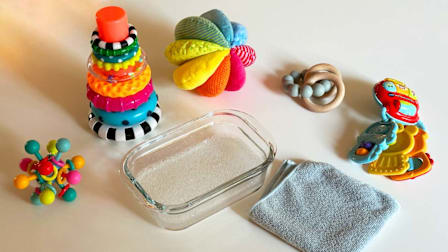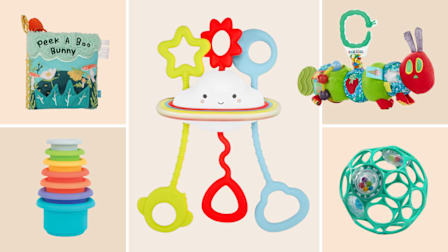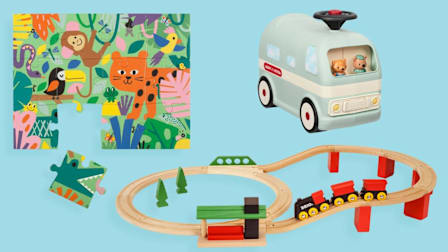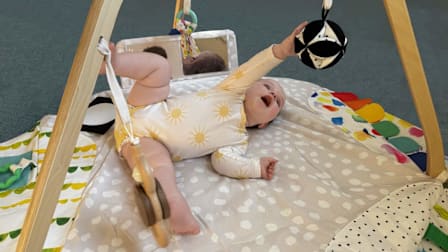These Are the Best Toys for 1-Year-Olds
Classic developmental toys for 1-year-olds that come toddler- and expert-approved
When you shop through retailer links on our site, we may earn affiliate commissions. 100% of the fees we collect are used to support our nonprofit mission. Learn more.
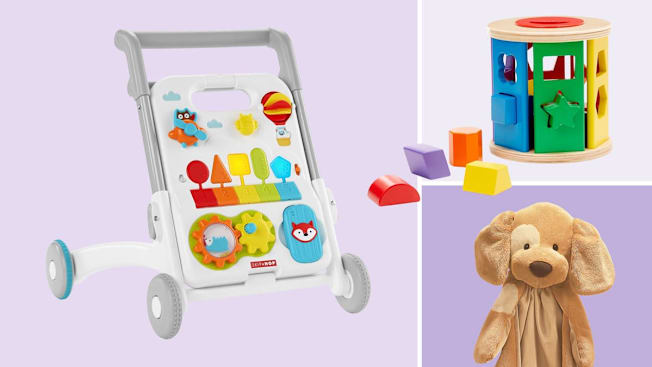
Welcome to the beginning of the toddler years. The transition can be tricky because while your baby’s brain development is booming, they’re still too young to tell you what they want in words. The state of their play starts changing at this age, too. Most parents of toddlers will tell you that they become more interactive, physically active, and (a little) more independent. They’ll also tap into exploring emotions—even some big ones.
So where do you start when it comes to finding the best toys for 1-year-olds? The best toys to look for are ones that will motivate your child, says Courtney Peebles, founder of Solobo Toys, a Montessori-inspired toy company. “You can watch a child interact with the world and objects around the house to get an idea of what types of toys they’d be interested in,” she says. “It does take some trial and error, but once you find the right toys, the development through play is the easiest part.”
And before you assume a child needs all the toys, keep in mind that less is usually more. “Toy quality is more important than toy quantity,” says Rachel Coley, a pediatric occupational therapist and Lovevery Child Development Expert in North Carolina. “If your child has lots of toys, I encourage parents to rotate which ones are available at any time,” Coley says. “Toy rotation can be quick and simple—replacing nine to 12 items with others from a closet or toy bin when you notice your child’s interest decreasing.”
Here are nine toys for 1-year-olds that experts recommend adding to your toy rotation.
Loveys
A lovey can be almost anything, but what’s most important is that it brings comfort and a feeling of security to your baby. It’s a great transitional object and is safe to introduce after 12 months. At this age, loveys are especially comforting for bedtime, and during times of unfamiliarity or change, like when traveling to a new location or starting at a new day care.
Our Pick
Gund Baby Spunky the Dog Huggybuddy
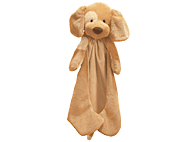
This is one of the softest loveys you’ll ever feel. It’s silky, the blanket is not too big, and there are no buttons that can pop off and be unsafe. Bonus: It’s machine-washable, so when the lovey inevitably gets stinky, you can toss him right in the wash. Pro tip—buy two and hide one away for when you lose the first one to prevent a massive meltdown.
Stacking and Nesting Toys
Stacking and nesting are two actions we adults do without even thinking, but for babies, they’re an engaging way to build coordination, develop fine motor skills, and learn how shapes can fit together. “Kids don’t need fancy toys to promote creativity,” says Mary Carol Burkhardt, associate professor of pediatrics at the University of Cincinnati and director of primary care in the division of general and community pediatrics at Cincinnati Children’s in Ohio. “It is often simple and classic toys that allow for the most growth.”
Toys that nest can also be used for container play. And best of all (from a 1-year-old’s point of view, anyway), once you’ve stacked something, you can also knock it down.
Our Pick
The First Years Stack & Count Stacking Cups
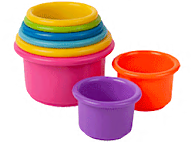
This set stacks and nests and can be used anywhere, from the outdoors to bath time. The rainbow colors can be used to encourage color recognition, and each cup is embossed with a numeral to encourage early number recognition as well. Best of all, the cups are BPA-free and can be easily wiped clean for those times they’re also used as impromptu snack holders.
Problem-Solving Toys
Children are like little scientists. They’re constantly exploring how things work, doing actions over and over again to see if they yield the same results. Problem-solving toys help to encourage this type of play, giving toddlers an “issue” to solve.
Our Pick
Melissa & Doug Match and Roll Shape Sorter
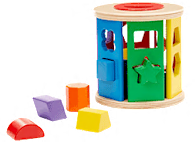
Shape sorter toys are classic for a reason, and this wooden shape sorter (which doubles as a rolling toy) is sturdy enough to hold up to hours of play. Let your little one experiment with putting a shape into each of the holes to figure out the perfect match. Try to hold yourself back from helping them, because nothing beats seeing their joy once they discover the solution on their own.
Blocks
Block play seems deceptively simple, but this activity encourages the development of both fine and gross motor skills in your child. They also get to tap into their imagination, play with spatial recognition, and learn how to problem-solve. “Blocks are a good choice because they can be stacked into simple towers at first, then gradually become buildings, roads, and entire cities as your child grows,” says Lizzie Assa, MsED, founder of The Workspace for Children. “Your child will use blocks for years to come.”
Our Pick
Lovevery Block Set
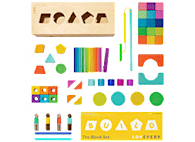
This 70-piece set comes with multiple types of blocks, from standard cubes to cylinders and threading blocks. The wooden storage box can be turned into a pull car, and the little people are a fun complement that can turn your towers into buildings or whole neighborhoods. Especially useful is the included activity guide that shows examples of how block play can evolve as your child grows.
Balls
Whether you’re sporty or not, encouraging your little one to play with balls gives them a chance to develop their gross motor skills, independent play, or collaborative play if engaging with another child. They’ll learn to kick, push, roll, throw, bounce, and catch with just one simple toy.
Our Pick
Edushape Original Sensory Balls
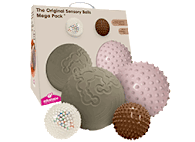
This set adds a sensory experience to the activity, with balls that are bumpy or spiky, grooved so you can trace your finger along the lines, or transparent so your baby can see what’s happening inside the ball when they toss or roll it around.
Art Toys
As babies start to get a little bigger and their hands become stronger, those little toddler fingers can navigate an art station with more ease than before. “Art materials like chunky crayons and large easel paper let them explore mark-making for the first time,” Assa says.
Our Pick
Honeysticks Beeswax Crayons
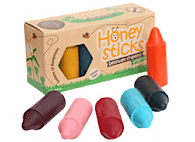
These have a wonderfully chunky shape to make it easy for small hands to grip and draw. They’re made with 100 percent beeswax and food-grade pigments, so they’re safe and nontoxic—because yes, your 1-year-old will probably try to take a bite. Bonus: The hefty shape also makes these crayons hard to break.
Play Tunnels
Take peek-a-boo to the next level with a play tunnel. Tunnels can inspire creative play while improving motor and coordination skills and fostering independence and discovery.
Our Pick
Tiny Land Play Tunnel
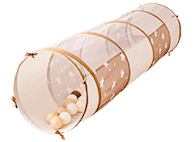
Tunnels with mesh sides help with airflow and breathability, and decrease the chances of overheating. Plus, adults can interact with babies as they crawl their way down the tunnel instead of having to wait at the end. “It is important that parents and siblings have positive interactions during play,” Burkhardt says. When not in use, the play tunnel can be easily folded and stored for another play date—which makes it an easy toy to pack if you are headed to a friend’s house or even a sibling’s sports game.
Push or Pull Toys
“One-year-olds are often taking big leaps in gross motor development, so push toys like a sturdy cart or wagon will support them as they become more confident walkers,” Assa says. These are wonderful for understanding what their bodies can and can’t do, developing gross motor skills, and encouraging independence.
Our Pick
Skip Hop 4-in-1 Toy Walker
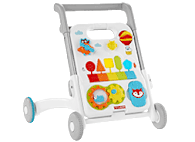
Some walkers can be a little too light, causing an unsteady baby to fall as they push forward. This walker allows parents to control the speed of the toy and has nonskid rear wheels. It’s also multipurpose, transforming into four different types of toys depending on age and stage. It can be a seated activity pad with the removable panel, a push walker, a shopping cart, and a stroller. (Note: Experts do not recommend the sit-in type of baby walkers for safety or development.)
Music Toys
Music play has tremendous benefits for your baby’s brain development. Playing with music toys helps motor skills, social-emotional skills, cognitive skills, and more, according to the baby and toddler development organization Zero to Three. And once you’re done with listening to your little one tap out notes on a toy xylophone, you can fire up Chappell Roan and have a dance party in the living room.
Our Pick
Hape Pound and Tap Bench With Slide Out Xylophone
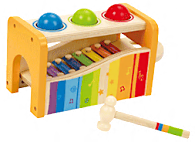
Every parent loves a good multifunctional toy, and this one gives baby two options for play. They can tap on the keys with the attached wooden mallet, or they can tap the balls down and see if those notes sound different. The toy is painted with water-based paint, the mallet has a rubberized head, and the ball holes are lined with silicone to help reduce wear and frustration.


